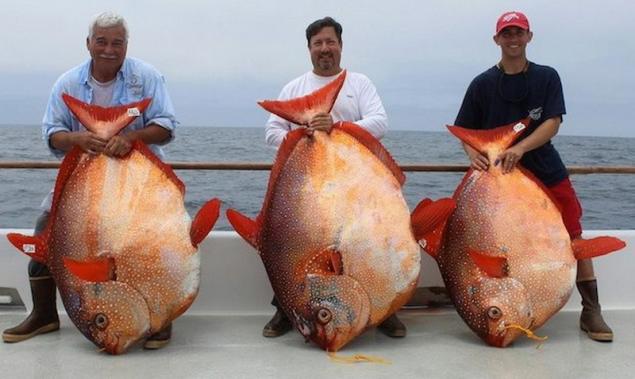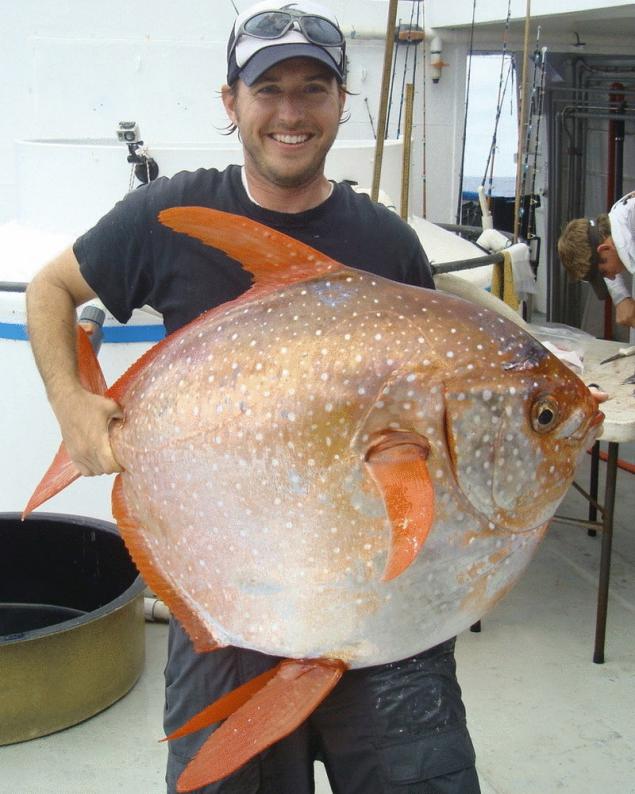419
In the ocean found the world's first warm-blooded fish
Sun fish (opah) the size of a car wheel attracts attention with its round silver body. Now, however, the researchers found in this deep sea fish is one truly amazing surprise: it has warm blood.

This makes red opah (Lampris guttatus) first ever warm-blooded fish. Most of the fish are ectothermal – that is, to maintain its temperature, they need heat from the environment. Opah is the endotherm and independently supports increased their body temperature while diving in the cold depths of up to 400 meters in temperate and tropical oceans around the world.
"Increased temperatures accelerate physiological processes inside the body," says the head of research biologist of the National office for research on ocean and atmospheric administration (NOAA), Nicholas Wehner. "As a result, the muscles contract faster, the temporal resolution of the eye is increased, and the transmission speed of nerve impulses increases". As a result, fish with warm blood swims faster and has the advantage over its cold-blooded prey slow.
Opah has a relatively small fins, framing her body, which, however, can grow up to 1.8 meters in length. These fins, seem to play a key role in the generation of heat for the body of the fish.
The first suspicion of a warm-blooded system of Obuhov was made when scientists examined samples of Gill tissue of the fish. In the gills of Obuhov vessels carrying warm blood from the exhaust oxygen from the depth of the body in contact with the blood vessels that carry cold oxygenated blood from the gills. As a consequence, simulated heats the incoming blood – this process is called protivoshokovym heat exchange. This is the first case in the world when this process is observed in fish.
To confirm their hypothesis, the researchers tagged a number of fish temperature sensors, and found that no matter how deeply immersed opah, its body temperature always remains about 5 degrees Celsius warmer than the surrounding environment. To support this internal heat fish help fat reserves around the gills and muscles.

The warm blood gives deep-sea fish advantage. Other deep water fish, like tuna and some shark species, can block blood flow to certain parts of your body to keep you warm while scuba diving. But these fish are forced to regularly climb to the top to prevent the failure of his organs.
In contrast, opah can stay at depth for much longer – as shown by observation, most of the time he spends at depths of over 50 meters.
The team is now Venus wants to learn Lampris immaculatus – South kinsman of opah. This southern opah lives in a much colder waters in which to maintain a body temperature much more difficult – but it gives an even more significant benefits.published
P. S. And remember, just changing your intake, we, together change the world! ©
Source: gearmix.ru/archives/19960

This makes red opah (Lampris guttatus) first ever warm-blooded fish. Most of the fish are ectothermal – that is, to maintain its temperature, they need heat from the environment. Opah is the endotherm and independently supports increased their body temperature while diving in the cold depths of up to 400 meters in temperate and tropical oceans around the world.
"Increased temperatures accelerate physiological processes inside the body," says the head of research biologist of the National office for research on ocean and atmospheric administration (NOAA), Nicholas Wehner. "As a result, the muscles contract faster, the temporal resolution of the eye is increased, and the transmission speed of nerve impulses increases". As a result, fish with warm blood swims faster and has the advantage over its cold-blooded prey slow.
Opah has a relatively small fins, framing her body, which, however, can grow up to 1.8 meters in length. These fins, seem to play a key role in the generation of heat for the body of the fish.
The first suspicion of a warm-blooded system of Obuhov was made when scientists examined samples of Gill tissue of the fish. In the gills of Obuhov vessels carrying warm blood from the exhaust oxygen from the depth of the body in contact with the blood vessels that carry cold oxygenated blood from the gills. As a consequence, simulated heats the incoming blood – this process is called protivoshokovym heat exchange. This is the first case in the world when this process is observed in fish.
To confirm their hypothesis, the researchers tagged a number of fish temperature sensors, and found that no matter how deeply immersed opah, its body temperature always remains about 5 degrees Celsius warmer than the surrounding environment. To support this internal heat fish help fat reserves around the gills and muscles.

The warm blood gives deep-sea fish advantage. Other deep water fish, like tuna and some shark species, can block blood flow to certain parts of your body to keep you warm while scuba diving. But these fish are forced to regularly climb to the top to prevent the failure of his organs.
In contrast, opah can stay at depth for much longer – as shown by observation, most of the time he spends at depths of over 50 meters.
The team is now Venus wants to learn Lampris immaculatus – South kinsman of opah. This southern opah lives in a much colder waters in which to maintain a body temperature much more difficult – but it gives an even more significant benefits.published
P. S. And remember, just changing your intake, we, together change the world! ©
Source: gearmix.ru/archives/19960























